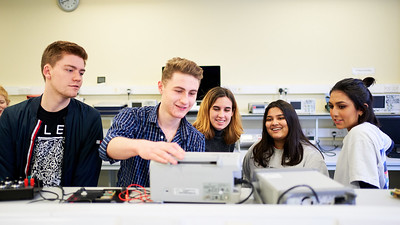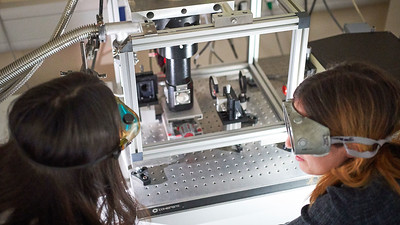Many people are put off choosing to study joint honours as they think that studying two subjects at once means double the work and no free time. I personally have to disagree. Yes, you do have to work hard though if you want to succeed; hard work is essential in all degrees regardless of whether you do single or joint honours.
A joint honours course means that your timetable will have more variety and you get to study a wider range of topics, which for me made the hard work easier and more enjoyable because I could choose what subject I wanted to work on each time instead of only having one option.
What is a joint honours degree?
Joint Honours in Maths and Physics means that you study three Maths modules and three Physics modules, one of these being laboratory work and computing.
How are the subjects taught?
At university, Maths and Physics are both taught in slightly different ways. Due to this, not only is your week varied by the subjects you’re studying but it is varied in the way that you learn and the activities that you do. This year as a result of COVID-19, teaching methods in both subjects have been adapted to suit the “Bath Blend”. (“Bath Blend” simply means a combination of both online and in-person teaching).
Maths is taught through three weekly live online lectures per module, a weekly problems sheet (this is a selection of questions, allowing you to practise the material that has been taught during the previous week) and a weekly tutorial. The tutorial takes place in-person and it is where a smaller group (8-10 students) meet with either a PhD student or a university lecturer. During the tutorial you go over the previous week’s lecture notes, asking any questions that you may have and then you work through the problems sheets, again asking questions if you are stuck.
Physics is taught slightly differently, the material is covered in pre-recorded lectures, followed by a weekly live lecture where the lecturer goes over the week’s material and answers any questions. Similar to Maths, you also get a weekly problems sheet and have a weekly tutorial.
Additionally, during your in-person teaching time, there is a time allocated to “peer study”. This is an unsupervised study period where you have the opportunity to work with other students on your course. This time has been especially valuable this year as due to COVID-19 you don’t meet as many people from your course as you do not attend in-person lectures.
Choosing Physics means that as well as learning the theory you will perform labs fortnightly and you will also learn how to code. If you have never coded before do not fear! Programming is taught from the very basics so you will be okay. I had never coded before and I have survived, so you can too!
Is there any free time?
Yes, this is a busy schedule, though I personally have enjoyed it and have found that I still have lots of free time to play sports, go for walks, attend various clubs and societies, as well as have fun with my housemates.
I have found the mixture of teaching styles through the “Bath Blend” very helpful because the live online Maths lectures provide structure as they take place at a certain time each week and as the Physics material is pre-recorded, I can choose to watch it whenever suits me best. Additionally, although the Maths lectures are live they are also recorded so if you sleep-in, don’t panic as you can watch them once they are put online, which is usually within the hour following the lecture.
Is there much difference between A level and university?
I personally have found the jump from A level to university more noticeable in the Maths modules. I feel that there is more overlap between A level and university Physics than there is with Maths, simply as the style of the Maths is different to A level. Though, there is lots of support at Bath. So, if you do feel that you are struggling at any point there will always be help easily available and accessible!
Where can I go for help?
When you begin studying at Bath you are given a university lecturer, called your Personal Tutor and you meet with them weekly. They will be a lecturer in the department of your chosen area of study and you can email them with any problems you have or you can discuss any issues in the weekly meeting.
You will also be assigned a Peer Mentor, who is an older student studying your course, again you can always email them with any questions and as they have done the course before they will be able to help.
Furthermore, MASH is something that runs multiple sessions weekly. MASH stands for “Maths and Statistics help” so you can go there with any problems or questions and they will be more than happy to help you. MASH is free, one to one, you don’t have to stay for the full session and you can ask as many or as few questions as you like. What more could you ask for?!
Summary
Obviously, this is all about my experience during the first semester before the January 2021 lockdown restrictions but regardless of this, in case you couldn’t tell, I couldn’t recommend choosing joint honours enough!
Although your timetable is busy, the busyness gives you variety and I don’t feel that it is so packed that you have no free time. There is a slight jump, especially in the Maths, from A level to university but there is loads of help and support available so you will definitely be able to make it.
As Theodore Roosevelt said, “Nothing worth having comes easy.”
Respond



